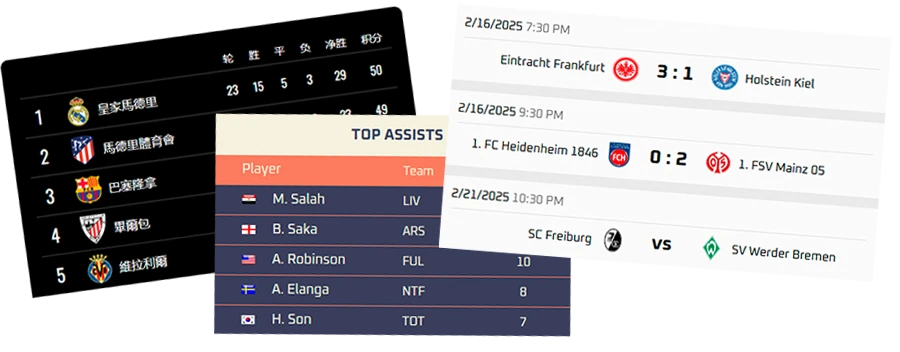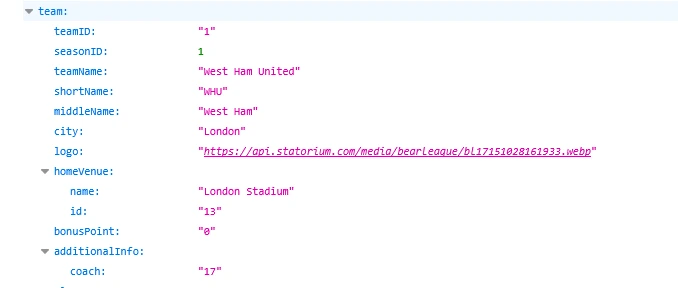How to add Sports Data to your website
The days of manually updating sports statistics on websites are long gone. Today, site owners can leverage advanced tools offered by many sports data providers to integrate sports data seamlessly. Let’s explore three popular ways to implement sports data into a website based on what the Statorium sports API team offers.
Adding HTML Widgets
Widgets are pre-built components provided by sports data providers that can be easily embedded into your site, no matter the site platform. This method is ideal for those who want a quick and straightforward solution without delving into coding. Statorium widgets, for example, offer a user-friendly way to integrate sports data while allowing for design customization.

Pros:
- Ease of Use: Widgets are simple to implement – just copy and paste the provided JavaScript code into your site. This method is accessible to users with little to no technical expertise.
- Quick Integration: Widgets can be added to your site in minutes, making them ideal for time-sensitive projects.
- Easy Design Customization: Statorium widgets allow you to configure styles, text fonts, and colors, ensuring the widget aligns with your site’s branding and design.
Cons:
- Limited Customization: While Statorium widgets offer design flexibility and limited structure (you can select language, columns, type of fields displayed). They may not provide the same level of customization as a custom API integration or JoomSport based implementation.
- No navigation: Since the data pulled from API directly widgets offer no navigation between the player/ team / match pages.
- Lack of Advanced Features: Widgets may not support advanced functionalities like interactive charts or custom data filtering, which APIs or JoomSport can offer.
Implementation via API
API (Application Programming Interface) integration is a method for pulling sports data directly from a provider’s database into your WordPress site. This approach is ideal for those with technical expertise who require full control over data presentation and functionality. It also requires an extensive budget to develop the integration and decide on the page structure you build.

Pros:
- Full Customization: APIs allow you to design custom layouts, filters, and interactive features tailored to your site’s needs.
- Real-Time Data: APIs often provide real-time or frequently updated data, ensuring your site always displays the latest statistics.
- Integration with Other Tools: APIs can be combined with analytics tools, chatbots, or other technologies to enhance user experience.
Cons:
- Technical Expertise Required: Implementing an API requires knowledge of programming languages like PHP, JavaScript, or Python.
- Time-Consuming: Developing custom code and testing the integration can be a lengthy process.
- Cost: It requires an extensive budget to build the planned integration. Many sports data providers also charge for API access, and the cost can increase depending on the volume of data requested.
Special Integration for WordPress: via JoomSport Plugin
For those who run WordPress or Joomla CMS based sites and are seeking a more advanced yet user-friendly solution, the JoomSport plugin is an excellent choice. JoomSport is a natively built WordPress plugin that has native integration with the Statorium API. It allows you to import sports data directly into its database. The data is then updated automatically using a cron job, ensuring your site always displays the latest information.
Pros:
- Full Navigation Between all Pages: JoomSport blocks and shortcodes offer you the full navigation between all stats pages, such as teams, players, and matches.
- SEO effect: You can decide yourself what kind of pages you want to add to your indexed sitemaps.
- Implementation Support: The Statorium team handles most of the implementation, including plugin setup and integration, saving you time and effort. The Special Offer to implement the turnkey solution for football clubs offered by Beardev.
- Flexible Shortcodes: One of JoomSport’s standout features is its extensive library of shortcodes. These shortcodes allow you to create and customize data blocks (e.g. schedules, player stats, league tables) and place them anywhere on your WordPress site.
- Automatic Updates: Data is imported from the Statorium API and updated regularly via a cron job, ensuring your site always displays the latest statistics without manual intervention.
- Native WordPress Integration: As a WordPress plugin, JoomSport integrates smoothly with your site’s existing features and themes.
- Prediction Game integration and Fantasy Football Plugins integration: The Statorium team offers fantasy and prediction plugins that are integrated with JoomSport out of the box. It is the easy way to organize great engagements for your sports fans.
- Cons:
- Data Update Delay: There is an additional lag (normally 60 seconds) between the moment when data is added to the API and when it is updated via the cron job.
- Some Additional Cost: JoomSport comes with an additional licensing fee. You need to purchase the Advanced JoomSport package, that has Statorium integration support included.
- Learning Curve: While JoomSport is user-friendly, it may take some time to fully explore and utilize all its features, especially for beginners.
Conclusion
Integrating sports data into your WordPress site has never been easier, thanks to the variety of methods available. Here’s a quick summary to help you decide:
- API Integration: Best for developers or those with technical skills who need full control and customization.
- Widgets: Ideal for non-technical users who want a quick and easy solution with design customization options, such as those offered by Statorium widgets.
- JoomSport Plugin: A powerful option for users who want a balance of flexibility and ease of use, with features like shortcodes, automatic data updates via the Statorium API, and implementation support from the Statorium team.
By carefully considering the pros and cons of each method, you can select the approach that best aligns with your goals and resources. Whether you’re building a sports news platform, a fan community, or a fantasy sports site, integrating sports data has never been more accessible.
Reviewed by Mikalai Yushkevich on October 15, 2025

Author: Dmitry Martinkevich
Dmitry Martinkevich is the co-founder and product manager of the BearDev team.
